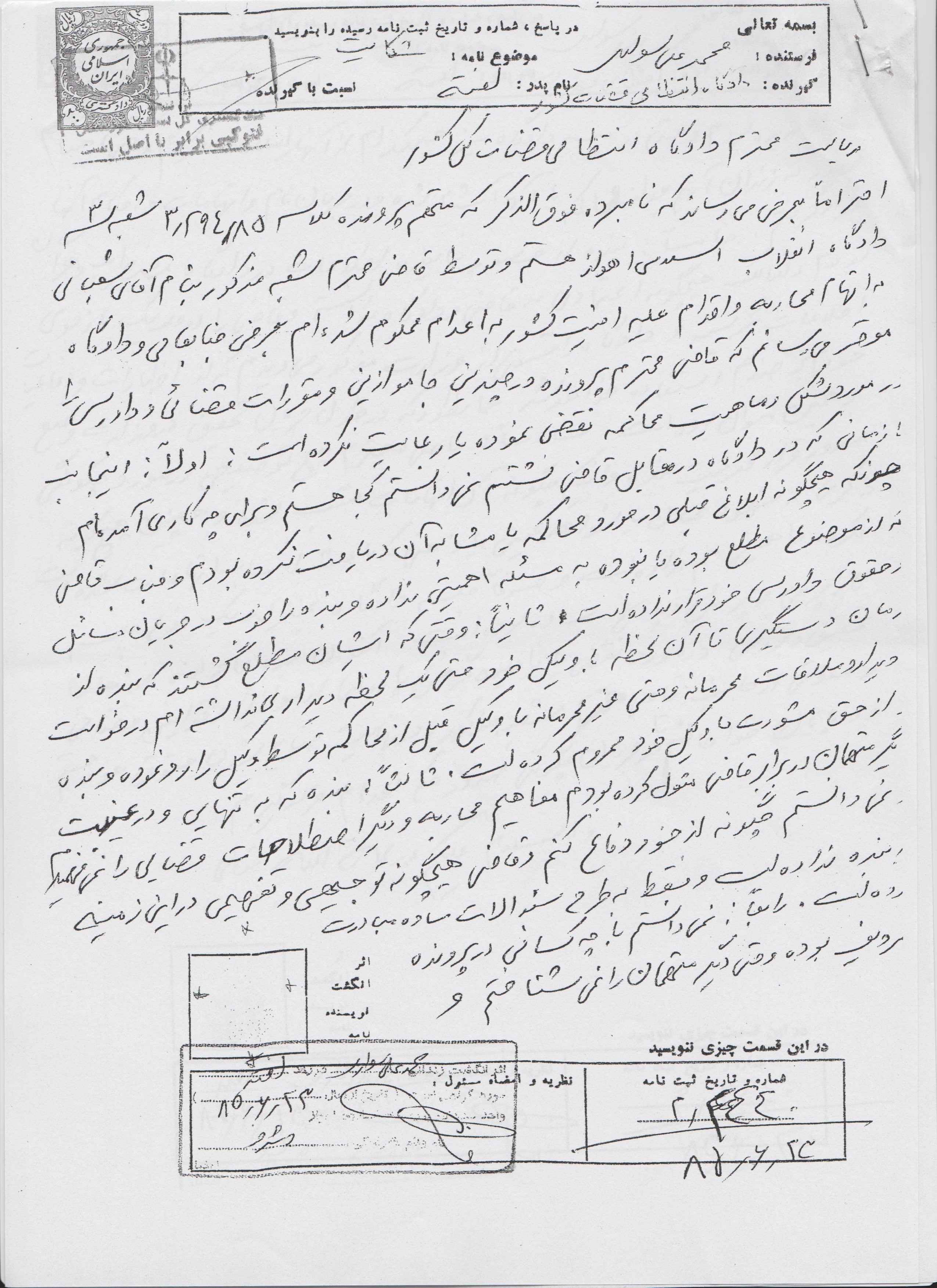Mohammad Ali Sawari: Judge Sha'bani Deprived Me of My Right To Counsel

ABF note: Mr. Mohammad Ali Sawari was an Arab-Iranian citizen living in the city of Ahvaz. He was an English teacher and a civil rights acitivist. He was arrested, along with his two brothers and scores of other activists, during the 2005 Ahvaz' unrests. He was kept in solitary confinement, in Shiraz and Ahvaz, for 10 months. He was sentenced to death by the Branch 3 of the Islamic Revolutionary Tribunal of Ahvaz for crimes such as "war against God." He was executed on 11 September 2007. In September 2006, Mr. Sawari filed a complaint against Judge Sha'bani who had sentenced him to death and described the violation of due process of law during the procedure that led to his conviction. This complaint was never processed but it reveals the extent of the violation of the rights of the accused by the Islamic Revolutionary Tribunal.
***
In the name of God.
Sender: Muhammad Ali Sawari
Subject of the letter: Complaint
Receiver: The National Disciplinary Tribunal of Judges
Father’s name: Lafteh
In the Name of God
I respectfully draw your attention to my conviction, Case No. 3/294/85, in Branch 3 of the Islamic Revolutionary Court in Ahvaz. I was sentenced to death by his highness, the judge of the above-mentioned division, Mr. Sha’bani, following the conviction for “moharebeh” [War against God] and “acting against national security.”
"The honorable judge did not provide any explanation, whatsoever, regarding his guilty finding, nor about how and why the charges had been brought against me, based on what witness testimony and what objective or subjective evidence."
I appeal to you and the respectable court that my case’s judge [Mr. Sha’bani] failed, in several places, to abide by judicial regulations or to implement them appropriately.
First: Before sitting in front of the judge at trial, I had no idea where I was and for what reason, because I had not received prior notification of a trial or any such thing. The honorable judge had either no knowledge of this, or had not attached any importance thereto, and had not informed me of my trial rights and issues.
Second: When he (the judge) learned that, from the moment I had been arrested until that very moment, I had not met with my attorney, even for an instant. He denied my attorney’s request to hold a confidential or non-confidential meeting with me, prior to the trial, and has thus deprived me of my right to counsel.
Third: I appeared before the judge by myself and in the absence of the other defendants and did not understand the notion of “Moharebeh” and other legal concepts and therefore did not know how to defend myself. The judge did not provide any explanation or justification in that regard.
Fourth: I did not know who my co-defendants were, and I had not seen them. Even during trial, I did not meet them. It was only upon going to prison, and that’s after the trial, that I met them and learned of their names, charges, and sentences.
Fifth: I was fearful of the presence of the representative of the Ministry of Information in the courtroom. I therefore did not trust the judge, whom I considered to be an interrogatorfrom the Ministry [of Information], or the court, which I considered to be an arm of the Ministry [of Information]. [I believed] that my statements in my own defense would be used against me, as they had been in the course of the investigations conducted by the Ministry of Information.
Sixth: The honorable judge did not provide any explanation, whatsoever, regarding his guilty finding, nor about how and why the charges had been brought against me [in the first place], based on what witness testimony and what objective or subjective evidence [was provided]. He simply did not consider it important. The court session was merely an interrogation and a question-and-answer session.Now, I humbly request an investigation into the violation, or avoidance, of some judicial and legal regulations and legislation perpetrated by the respected judge of the previously mentioned branch, which eventually resulted in the loss of my rights. I also request to be informed of the circumstances of how I was sentenced to execution.
“And peace upon you and God’s mercy and blessings”
Muhammad Ali Sawari [and the fingerprint]
September 14, 2006
م/۲۴۴۰ (۸۵/۶/۲۳)